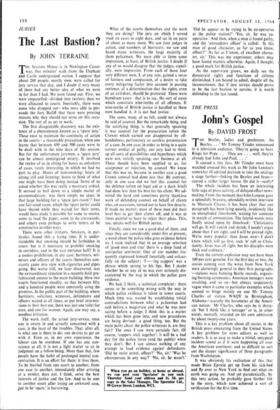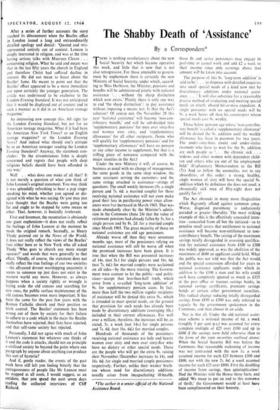John's Gospel
THE PRESS
By DAVID FROST
HE Beatles, ladies and gentlemen, the Beatles. .. .' Mr Tommy Trinder announced to a television audience, 'They're going to have Ringo for Pope . . . They are . . . well, they've already had John and Paul. . .
It caused a tiny fuss. Mr Trinder must have watched amused this week as Mr John Lennon's somewhat ill-advised decision to take the analogy a stage further—linking the Beatles and Jesus— caused a rather larger furore. Or did it—really?
The whole incident has been an interesting little saga of press activity, of delayed-effect news- making. From the moment that John Lennon gave a splendidly bravura, splendidly-written interview to Maureen Cleave, it has been clear that one paragraph has been lying quietly, insidiously like an unexploded time-bomb, waiting for someone in search of ammunition. The fateful words were finally seized upon by Datebook: 'Christianity will go. It will vanish and shrink. I needn't argue about that. I am right, and I will be proved right. We're more popular than Jesus now—I don't know which will go first, rock 'n' roll or Chris- tianity. Jesus was all right, but his disciples were thick and ordinary.'
Even the current explosion may not have been 100 per cent genuine. For the first day or two, the stories coming over the wires from New York were alarmingly general in their first paragraphs —stations were banning Beatle records, organis- ing burning ceremonies, American teenagers were revolting, and so on—but always suspiciously vague when it came to particular examples which seemed to hinge mainly on one Mr Tommy Charles of station WAQY in Birmingham, Alabama—scarcely the barometer of the Ameri- can nation : Mr Charles, who says he is thirty- six 'but I think like a teenager' or is, in other words, mentally retarded on his own admission by about twenty-one years.
This is a key problem about all stories in the British press emanating from the United States, A key problem for news editors as well as readers. It is so easy to make a trivial, untypical incident sound as if it were happening all over the American continent, and so difficult to sort out the deeper significance of three paragraphs from Washington.
It was obviously his realisation of this that made Brian Epstein get up from his sick-bed and fly over to New York to find out what on earth was going on. And yet paradoxically, by this very action, he probably gave further life to the story, which now achieved a sort of verification for the first time. After a series of further accounts the story reached its d6nouernent when the Beatles office in London issued a long and extraordinarily detailed apology and denial: 'Quoted and mis- represented entirely out of context. Lennon is deeply interested in religion, and was at the time having serious talks with Maureen Cleave . . . concerning religion. What he said and meant was that in the last fifty years the church in England and therefore Christ had suffered decline in interest. He did not mean to boast about the Beatles' fame. He meant to point out that the Beatles' effect appeared to be a more immediate one upon certainly the younger generation. The article was understood to be exclusive to the London Evening Standard. It was not anticipated that it would be displayed out of context and in such a manner as it did in an American teenage magazine.'
An interesting new concept this. All right for the London Evening Standard, but not for an American teenage magazine. What if it had been the American New York Times? or an English teenage magazine? or the London Evening News? And indeed what should one's attitude be to an American teenager reading the London Evening Standard? Anyway, the statement con- cludes: 'In -the circumstances John is deeply concerned and regrets that people with deep religious beliefs should have been offended in any_way.'
Well . . what does one make of all that? It is not merely a question of what you think of John Lennon's original statement. You may think it was splendidly refreshing to hear a pop singer speaking his mind, whether you agreed or dis- agreed with what he was saying. Or you may just have thought that the Beatles were going too far and ought to be stopped by some means or other. That, however, is basically irrelevant.
First and foremost, the recantation is obviously one giant euphemism-it does not really reflect the feelings of John Lennon at the moment he made the original remark. Secondly, as Henry Thody pointed out in the News of the World, it does not really reflect the views of the Beatles' fans either here or in New York who all asked Thody 'Who goes to church any more except squares?' and words that were generally to that effect. Thirdly, of course, the statement does not really reflect the true feelings of our two societies -the affronted devout worshipping unanimity it seems to summon up just does not exist in the western world any more. However, as always happens when a society rightly or wrongly is laying aside the old canons and searching for new ones, the public surface maintenance of the old canons becomes even more important. It has been the same for the past few years with the Roman Catholic church and their position on birth control. The Beatles' statement has been wrung out of them by society for their failure to adhere to a code which in the main the Beatles themselves have rejected, their fans have rejected, and that self-same society has rejected.
Personally, I did not agree with much of John Lennon's statement but whatever one thinks of it and the code it attacks, should not on principle a civilised society be beyond the point where one paragraph by anyone about anything can produce this sort of hysteria?
And if, gentle reader, the events of the past week have still left you feeling bitterly that the outrageousness of people like Mr Lennon must be stopped at all costs, I would suggest, as an antidote, that you spend the next seven days reading the collected interviews of 'Cliff. Richard.































 Previous page
Previous page